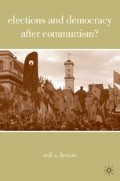Abstract
Research on elections focuses on most aspects of the voting process: how political actors select and modify election rules, how these rules influence behavior, how citizens decide to vote and develop attachments to parties and politicians, and how parties emerge and function. By contrast, research on the administrative architecture of elections plays a modest role in the electoral studies literature.1 Yet, the organizations charged with administrative and oversight responsibilities determine who can contest seats, which voters may participate, and if the rules have been violated, as well as managing the casting, counting, and compiling of results. These institutions also create incentives that may influence the behavior of political actors. As the infamous saying suggests, “It doesn’t matter who votes, but who counts the votes.”2
Access this chapter
Tax calculation will be finalised at checkout
Purchases are for personal use only
Preview
Unable to display preview. Download preview PDF.
Copyright information
© 2009 Erik Herron
About this chapter
Cite this chapter
Herron, E.S. (2009). Administrative Architecture of Elections. In: Elections and Democracy after Communism?. Palgrave Macmillan, New York. https://doi.org/10.1057/9780230621701_8
Download citation
DOI: https://doi.org/10.1057/9780230621701_8
Publisher Name: Palgrave Macmillan, New York
Print ISBN: 978-1-349-37047-4
Online ISBN: 978-0-230-62170-1
eBook Packages: Palgrave Political & Intern. Studies CollectionPolitical Science and International Studies (R0)

